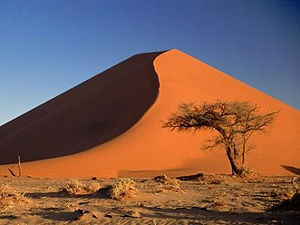Eyktol Flora
From Mizahar Lore
(Difference between revisions)
(→Flora of Eyktol) |
(→Flora of Eyktol) |
||
| Line 45: | Line 45: | ||
'''Clime:''' Grows along vines in the most temperate climates in Eyktol. It can be found in gardens or snaking along walls. They can also be find in coastal environments, thriving in the moisten air. It is a hardy vegetable, however the desert atmosphere still makes these a rare find.<br /> | '''Clime:''' Grows along vines in the most temperate climates in Eyktol. It can be found in gardens or snaking along walls. They can also be find in coastal environments, thriving in the moisten air. It is a hardy vegetable, however the desert atmosphere still makes these a rare find.<br /> | ||
| + | |- | ||
| + | |[[File:Hik_Fruit.jpg|300px]] || <u><big>'''Hik Fruit'''</big></u><br /> | ||
| + | |||
| + | '''Seasons:''' Year-round.<br /> | ||
| + | |||
| + | '''Appearance:''' The Hik Fruit is a parasite, growing alongside other nutrient rich trees and stealing their water supply. Possessing a scaly outer shell, it protects itself from the hot sun, while its opening emits rotten smells. Inside the opening are sensitive "hairs". When touched, they will emit an even stronger smelling odor.<br /> | ||
| + | |||
| + | '''Purposes:''' There have been several disputes about whether the Hik is a fruit or a fungi. In its natural form, it tastes terrible. However, in the desert, one cannot turn down such an able source of water and nutrients. Only after several hours drying the plucked fruit in the sun, will the renk odor fade. Because of the fruit's water intake, it makes an excellent traveling food. When dried, the fruit can be cut into long moist strips, similar to a jerky. Because of the plant's biochemical makeup, it's moisture does not get evaporated by the hot desert sun. When biten, natural sweet juices from the fruit will pour out and quench thirst and hunger as one.<br /> | ||
| + | |||
| + | '''Clime:''' The desert hardened areas of Eyktol. Growing at the base of desert trees, like the Acacai, it sucks off their precious water supply. <br /> | ||
|- | |- | ||
|- | |- | ||
Revision as of 20:24, 24 October 2012
Below is a brief sketch of distinct flora indigenous to Eyktol.





